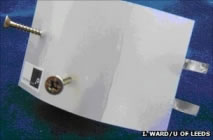Researchers from the University of Leeds have developed a polymer jelly that could make batteries of the future safer, cheaper, smaller and more powerful. The technology could lead to thinner and lighter notebook computers and more efficient batteries for electric cars, according to a report from the BBC.
Current lithium batteries are comprised mostly of volatile and hazardous liquid electrolyte that is susceptible to dangers like leakage and overheating, a phenomenon called thermal runaway – a serious concern for notebook manufacturers.
Dell was forced to recall over four million notebook batteries in August 2006 after it came to light that they could overheat and pose a fire hazard. HP had to do the same in 2009 when it was discovered that 70,000 batteries were deemed unsafe.
While today's electric cars are much more efficient than gasoline-powered vehicles, the concept is still hindered by excessive weight and cost from multiple batteries and redundant safety features required to prevent overheating. Jelly batteries are said to have no risk of thermal runaway which would eliminate the heavy and costly safety mechanisms, resulting in better performance and driving range between charges.
Researchers were able to combine a rubber-like polymer with liquid electrolyte into a thin, flexible jelly that lies between the battery electrodes. As such, the solid jelly wouldn't leak if a battery were punctured
There is no release date for these new jelly batteries but ITpro believes that we could begin seeing them in commercial use within the next couple of years. According to their report, the technology has already been licensed to California-based PolyStor Energy Corporation.
